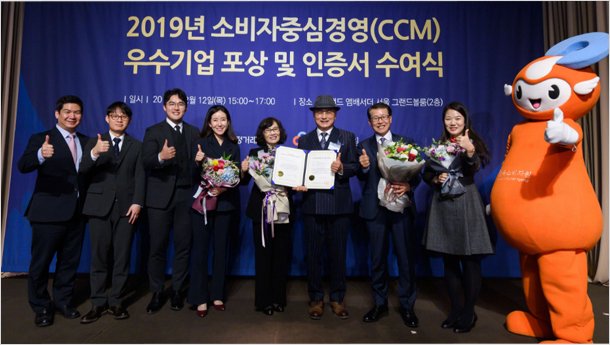In the rapidly evolving landscape of consumer rights and business practices, CCM Certification stands as a cornerstone for enhancing consumer rights and utility. By earning the Consumer Centered Management (CCM) Certification, a company demonstrates a steadfast commitment to continuously planning, conducting, and improving its activities from the consumer’s perspective, thus fostering a more transparent and reliable market environment.
Table of Contents
This certification not only fortifies consumer trust through prompt and sensible issue resolution but also empowers companies like Atomy, the first in the network marketing industry to maintain continuous accreditation, to elevate their product quality and service standards. As social costs are minimized and markets become more virtuous with consumers at the center, the spread of a win-win culture between consumers and corporations becomes increasingly potent, underscoring the significant impact of CCM on global sustainability and ethical business practices.
CCM Certification: Enhancing Consumer Rights and Utility


Have You Ever Wondered How Certification Can Improve Consumer Rights and Utility?
Certification processes are ubiquitous in various industries, from healthcare to environmental management. But what about consumer rights? How does a specific certification impact the rights and utility of consumers? Welcome to Global Atomy, a case study in Consumer Centered Management (CCM) certification. This article takes a deep dive into how CCM certification significantly enhances consumer rights and utility.
Overview
CCM certification plays a crucial role in safeguarding consumer rights and elevating the utility of products and services. With the rise in consumer awareness and regulatory standards, companies are increasingly adopting consumer-oriented management practices. This article aims to explore the importance of CCM certification in enhancing consumer rights and utility, referencing Global Atomy as a key case study.
Thesis Statement
CCM certification serves as a vital tool that ensures companies consistently prioritize consumer rights and utility in their management practices, ultimately fostering a virtuous cycle of satisfaction and trust between corporations and consumers.
Historical Context
What Is CCM?
Consumer Centered Management (CCM) certification recognizes companies that continuously plan, conduct, and improve activities from the consumer’s perspective. Accredited by the Korea Fair Trade Commission and managed by the Korea Consumer Agency, this certification ensures that companies meet rigorous standards aimed at optimizing consumer utility and protecting consumer rights.
The Evolution of Consumer Rights
The concept of consumer rights has evolved over the decades. In the early 20th century, consumer protection was minimal. Fast forward to today, there are complex regulations and standards in place to ensure that consumers are treated fairly and their interests are safeguarded. CCM certification is an embodiment of this evolution, providing a structured framework for companies to adhere to.

Current Trends
Growing Consumer Awareness
In the digital age, consumers are more informed than ever. They seek transparency, quality, and assurance from the products and services they consume. This trend necessitates that companies adopt management systems like CCM to meet these heightened expectations.
Regulatory Pressures
Regulatory bodies worldwide are tightening their consumer protection laws. For instance, the European Union’s General Data Protection Regulation (GDPR) emphasizes consumer data protection, reflecting a broader trend towards rigorous consumer rights legislation. CCM certification aligns with these regulatory trends, ensuring that companies comply with evolving standards.
Key Concepts and Definitions
Consumer Utility
Consumer utility refers to the satisfaction or benefit derived from consuming a product or service. High consumer utility often translates to higher consumer satisfaction and loyalty.
Consumer Rights
Consumer rights encompass a range of entitlements, including the right to safety, the right to be informed, the right to choose, and the right to be heard. These rights form the cornerstone of consumer protection frameworks like CCM.

This image is property of global.atomy.com.
Detailed Exploration
How CCM Certification Enhances Consumer Utility
- Information Provision: Under CCM, companies are mandated to provide comprehensive information about their products and services. This transparency aids consumers in making informed choices, thereby enhancing utility.
- Prompt Issue Resolution: Accredited companies are committed to resolving consumer issues efficiently. This swift redressal mechanism significantly boosts consumer satisfaction and utility.
Strengthening Consumer Rights Through CCM
- Increased Awareness: CCM certification helps in raising awareness among company employees about consumer rights, fostering an organizational culture that prioritizes consumer interests.
- Competitive Edge: Companies with CCM certification often gain a competitive edge in the market, as they are perceived as consumer-friendly, ethical, and reliable.
Example 1: Atomy’s Commitment to Consumer Centered Management
Atomy’s Vision and Mission
Atomy, a leader in the network marketing industry, exemplifies CCM certification excellence. The company’s vision is focused on customer success, while its mission emphasizes service over success. Their approach encapsulates “Absolute Quality! Absolute Price! Absolute Service!” ensuring that consumer utility is maximized at every touchpoint.
Case Study: Atomy’s Zero-Complaint Strategy
Atomy has implemented a zero-complaint strategy through preemptive risk management and Voice of Consumer (VoC) management. This approach has not only minimized consumer grievances but also fostered an unforgettable shopping experience, thereby elevating consumer utility.
Example 2: Atomy’s Eco-Friendly Policy
Sustainability and Consumer Utility
Atomy’s eco-friendly policy emphasizes sustainability, aligning with consumer preferences for environmentally responsible products. By incorporating sustainable practices into their product lifecycle, Atomy has enhanced consumer utility while contributing to environmental conservation.
Social Contributions
Moreover, Atomy integrates social contributions into its business model. Purchases contribute to donations and community support, further enhancing consumer utility by aligning consumer actions with broader social benefits.
Comparison of Different Perspectives
Traditional vs. Consumer-Centered Approach
| Aspect | Traditional Approach | Consumer-Centered Approach (CCM) |
|---|---|---|
| Focus | Profit Maximization | Consumer Satisfaction |
| Issue Resolution | Post-facto | Preemptive and Prompt |
| Information Transparency | Limited | Comprehensive and Clear |
| Employee Awareness | Low | High |
While the traditional approach primarily focuses on profit maximization, the consumer-centered approach under CCM places consumer satisfaction at the forefront, offering comprehensive information, preemptive issue resolution, and increased employee awareness.
Impact Assessment
Positive Outcomes of CCM
- Reduced Social Costs: By eliminating unnecessary ex-post settlements and administrative procedures, CCM contributes to a more efficient market.
- Virtuous Market Cycle: The emphasis on consumer satisfaction creates a virtuous cycle where company excellence and consumer trust reinforce each other.
Challenges and Limitations
Despite its benefits, CCM certification is not without challenges. Companies may find it resource-intensive to maintain the continuous improvements required for certification. Additionally, aligning every aspect of business operations with consumer perspectives can be complex.
Future Directions and Implications
Predictions
The future of CCM certification looks promising, with advancements in technology and data analytics offering new ways to enhance consumer utility. Companies are expected to harness these tools for more personalized and proactive consumer management.
Implications for the Industry
The broader implications of CCM certification extend beyond individual companies. Industry-wide adoption of consumer-centered practices can elevate consumer standards, driving innovation and quality improvements across sectors.
Conclusion
Recap
This article has explored the multifaceted impact of CCM certification on consumer rights and utility. From historical context to current trends, key concepts, and detailed case studies, the discussion underscores how CCM serves as a critical tool for companies aiming to elevate consumer satisfaction.
Final Thought
In an increasingly consumer-driven market, the adoption of CCM certification is not just a regulatory compliance measure but a strategic move towards building lasting consumer trust and loyalty. As consumers become more empowered, companies must innovate and adapt to meet their evolving needs. Thus, the question remains: How will your organization embrace the principles of Consumer Centered Management to enhance consumer rights and utility?
Engagement
Readers are encouraged to share their thoughts, experiences, or questions about CCM certification. Your engagement helps in fostering a deeper understanding and furthering the conversation on this critical topic.
Credible Sources
- Korea Fair Trade Commission: Annual Reports on Consumer Protection
- Korea Consumer Agency: Guidelines and Manuals on Consumer Rights
- Global Atomy: Sustainability and Consumer Management Reports
- Academic Journals on Consumer Rights and Business Ethics
For further reading and exploration, these sources provide comprehensive insights into the principles and practices of CCM certification.


